



















|


Bill Pullman and Patricia Arquette in Lost Highway
(©1996 October Films. All rights reserved.) |
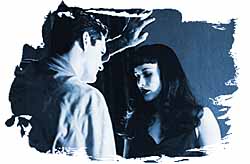
One day the front door's intercom buzzes and when Fred answers, a man mutters "Dick Laurent is dead" and then disappears. Fred doesn't know what it means, but soon afterwards a video tape lands on their front step. Renee acts vaguely guilty of the video, as if she may have something to hide, but she agrees to watch it with Fred. They see some grainy footage of the exterior of their house. "Must be a real estate agent," says Renee. But the next day another tape shows up, and this time the photographer enters the house and photographs Fred and Renee as they sleep.
This is just the beginning of Lost Highway, one of David Lynch's scariest movies yet. The intruder isn't just entering the home of Fred and Renee: he's entering their minds--or at least Fred's mind anyway. And this intruder becomes personified in the white-faced, gecko-eyed guise of Robert Blake, who acts like Yoda on acid, a superbly nasty creation who may or may not be strictly a figment of Fred's imagination.
|

Robert Blake in Lost Highway
(©1996 October Films. All rights reserved.) |
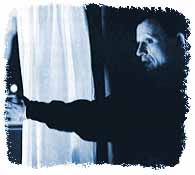 But Lost Highway also tells the story of a young mechanic, Pete Dayton (Balthazar Getty), a mechanic who works on cars for a gangster called Mr. Eddy (Robert Loggia). One day Mr. Eddy pulls up in his convertible Cadillac. Pete sees the knockout blonde sitting beside Mr. Eddy. Their eyes meet and it's love at first sight. But, hmm, she looks a lot like Renee Madison. Are they the same woman? Whatever the case, Pete and the blonde (she calls herself Alice Wakefield) can't keep their hands off of each other. And soon she's begging Pete to run away with her. But first, they'll need a little money, and what's a little murder after all between lovers?
But Lost Highway also tells the story of a young mechanic, Pete Dayton (Balthazar Getty), a mechanic who works on cars for a gangster called Mr. Eddy (Robert Loggia). One day Mr. Eddy pulls up in his convertible Cadillac. Pete sees the knockout blonde sitting beside Mr. Eddy. Their eyes meet and it's love at first sight. But, hmm, she looks a lot like Renee Madison. Are they the same woman? Whatever the case, Pete and the blonde (she calls herself Alice Wakefield) can't keep their hands off of each other. And soon she's begging Pete to run away with her. But first, they'll need a little money, and what's a little murder after all between lovers?
|

 Balthazar Getty and Patricia Arquette in Lost Highway Balthazar Getty and Patricia Arquette in Lost Highway
(©1996 October Films. All rights reserved.) |
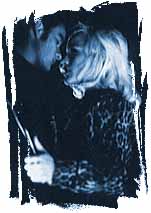
As Lost Highway zips back and forth between stories, fueled by the grinding guitar and feedback of Nine Inch Nails, The Smashing Pumpkins, Marilyn Manson, and Lou Reed, the movie toys with reality, giving us characters forever isolated from usual contact, who only find release through deceit and deception, and taking us on a journey through snuff films, porno reels, and murder. The impossible happens in Lost Highway: a man turns into another man, a man places a telephone call to himself at another location across town (and he answers!), a man already dead whispers into an intercom--this is the stuff of Lost Highway.
|

Robert Loggia in Lost Highway
(©1996 October Films. All rights reserved.) |
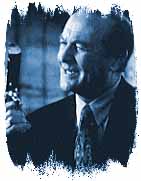 Whether David Lynch and Barry Gifford actually know where all the clues lead to is anybody's guess. No clear cut explanations come from the movie. At one point, Pete asks his parents (Gary Busey and Lucy Butler) about a certain momentous evening that he has blacked out entirely. Their eyes become teary but they won't tell him what happened. Likewise, the movie remains mute about the puzzle of events.
Whether David Lynch and Barry Gifford actually know where all the clues lead to is anybody's guess. No clear cut explanations come from the movie. At one point, Pete asks his parents (Gary Busey and Lucy Butler) about a certain momentous evening that he has blacked out entirely. Their eyes become teary but they won't tell him what happened. Likewise, the movie remains mute about the puzzle of events.
It's my guess that Lost Highway will die a quick death in theaters, a victim of its own oblique, perverse brand of storytelling that owes as much to Kafka as it does to film noir. But through video the movie will attain cult status. Video will allow people to inspect and reinspect the clues and to start piecing together theories about the events in Lost Highway. But I suspect all the analysis in the world won't ever really get at the heart of this movie because it doesn't really have a heart. Instead, Lost Highway is about style, not literal storytelling, where Lynch and Gifford take us on a journey through an expressionistic landscape of loneliness, paranoia, desperation, and decadence.
As the movie careens down its circular avenues and loops back on itself, the movie's title becomes a description of the movie's atmosphere: Lost Highway is a place where we don't know where we're going, where the trip doesn't seem to end, where the headlights only light up a few more yards of blackness that stretches out forever. Lost Highway isn't particularly satisfying cinema, but it isn't meant to be satisfying. It pushes us into the edge of a big void and then strands us, without a map to get back home.

 An October Films Presentation An October Films Presentation |  |
|
|

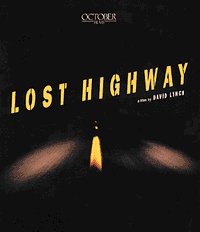


 But Lost Highway also tells the story of a young mechanic, Pete Dayton (Balthazar Getty), a mechanic who works on cars for a gangster called Mr. Eddy (Robert Loggia). One day Mr. Eddy pulls up in his convertible Cadillac. Pete sees the knockout blonde sitting beside Mr. Eddy. Their eyes meet and it's love at first sight. But, hmm, she looks a lot like Renee Madison. Are they the same woman? Whatever the case, Pete and the blonde (she calls herself Alice Wakefield) can't keep their hands off of each other. And soon she's begging Pete to run away with her. But first, they'll need a little money, and what's a little murder after all between lovers?
But Lost Highway also tells the story of a young mechanic, Pete Dayton (Balthazar Getty), a mechanic who works on cars for a gangster called Mr. Eddy (Robert Loggia). One day Mr. Eddy pulls up in his convertible Cadillac. Pete sees the knockout blonde sitting beside Mr. Eddy. Their eyes meet and it's love at first sight. But, hmm, she looks a lot like Renee Madison. Are they the same woman? Whatever the case, Pete and the blonde (she calls herself Alice Wakefield) can't keep their hands off of each other. And soon she's begging Pete to run away with her. But first, they'll need a little money, and what's a little murder after all between lovers?

 Whether David Lynch and Barry Gifford actually know where all the clues lead to is anybody's guess. No clear cut explanations come from the movie. At one point, Pete asks his parents (Gary Busey and Lucy Butler) about a certain momentous evening that he has blacked out entirely. Their eyes become teary but they won't tell him what happened. Likewise, the movie remains mute about the puzzle of events.
Whether David Lynch and Barry Gifford actually know where all the clues lead to is anybody's guess. No clear cut explanations come from the movie. At one point, Pete asks his parents (Gary Busey and Lucy Butler) about a certain momentous evening that he has blacked out entirely. Their eyes become teary but they won't tell him what happened. Likewise, the movie remains mute about the puzzle of events.
